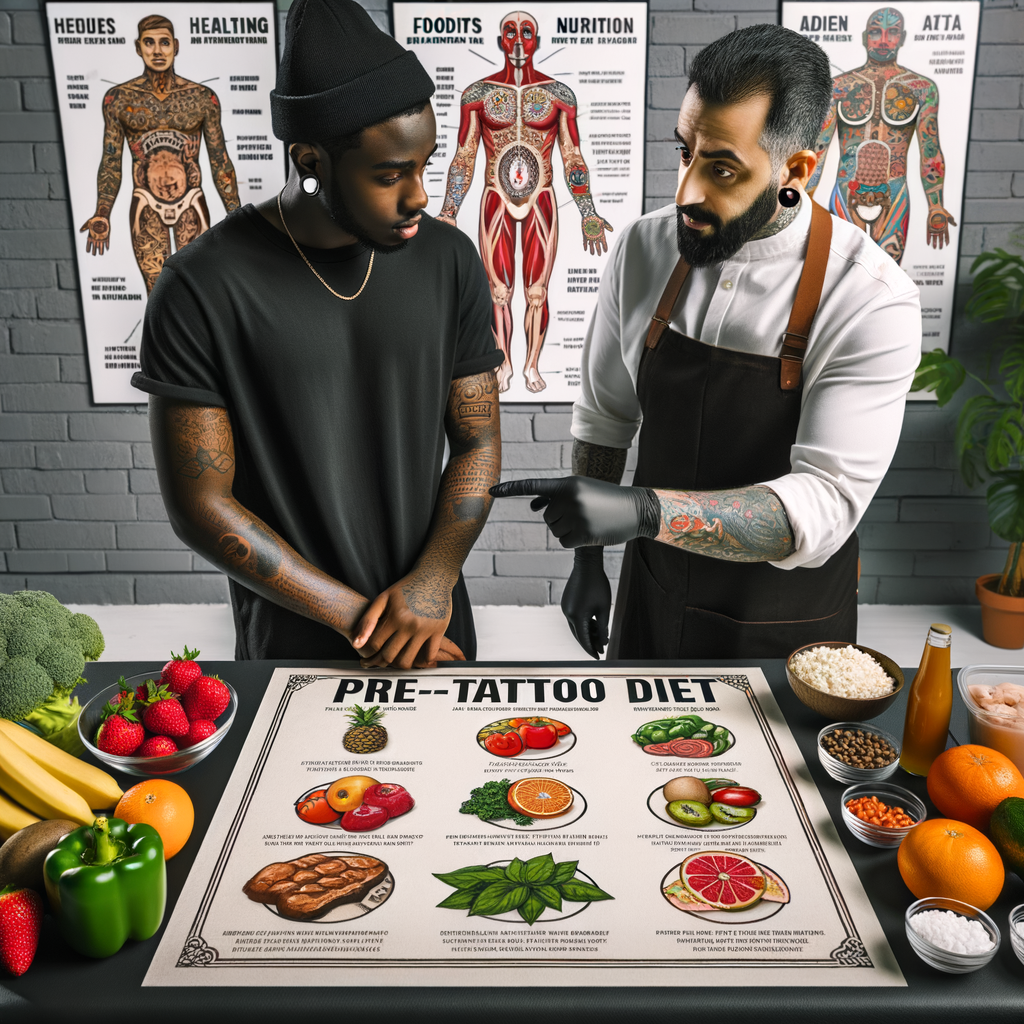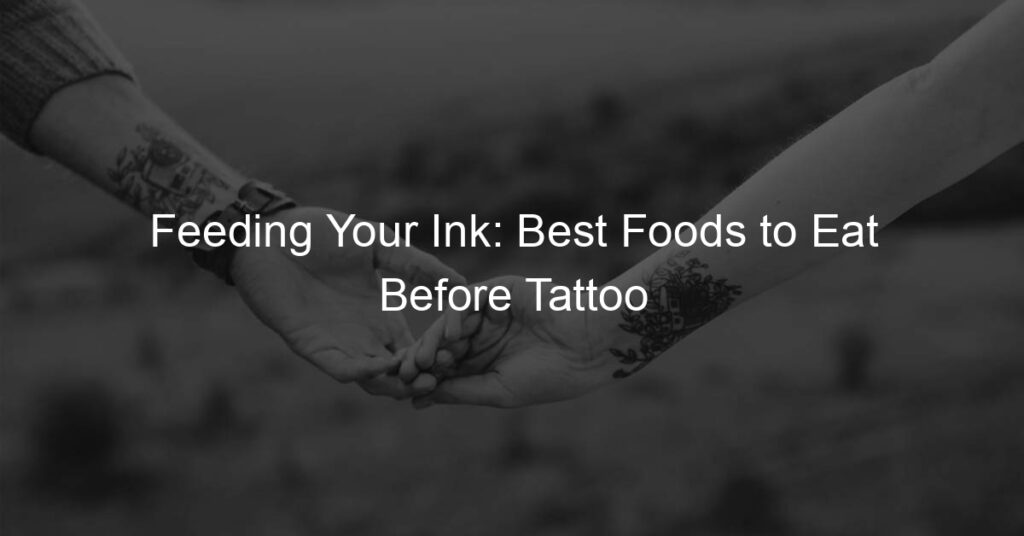
Introduction: Tattoo Preparation Tips
Getting a tattoo is a significant decision. It’s not just about choosing the right design or finding the perfect tattoo artist. It’s also about preparing your body for the process. In this blog post, we will discuss some essential tattoo preparation tips, focusing on the importance of preparing for a tattoo session and the role of diet in tattoo preparation.
-
- Importance of preparing for a tattoo session
Preparing for a tattoo session is crucial for a smooth and successful tattooing experience. It helps to reduce the chances of complications and ensures that your body is in the best condition to handle the process. For instance, staying hydrated can improve your skin’s condition, making it easier for the tattoo artist to work on your skin. Also, getting a good night’s sleep before your session can help you stay relaxed and comfortable during the process.
-
- Role of diet in tattoo preparation
Your diet plays a significant role in preparing for a tattoo session. Eating a balanced diet rich in vitamins and minerals can boost your immune system, promote skin health, and speed up the healing process after getting a tattoo. On the day of your tattoo session, it’s recommended to eat a light meal to keep your blood sugar levels stable. Avoid consuming alcohol or caffeine as they can thin your blood and cause excessive bleeding during the tattooing process.
In the following sections, we will delve deeper into understanding the tattoo process, the importance of nutrition before and after getting a tattoo, and the steps to prepare for a tattoo session. We will also discuss the tattoo healing process and how to care for your tattoo through proper nutrition.
Understanding the Tattoo Process
Getting a tattoo is more than just a piece of art on your body. It’s a process that involves your skin, your body’s response, and even your nutrition. Let’s dive into what happens when you get inked.
Getting Inked: What Happens to Your Body?
When you decide to get a tattoo, you’re not just deciding on a design. You’re also preparing your body for a unique process. Here’s what happens:
-
- Physical impact of getting tattooed
Getting a tattoo means having a needle pierce your skin hundreds of times per minute. This process injects small droplets of ink into the dermis, the second layer of skin. The dermis is more stable than the outer layer, the epidermis, which is why tattoos are permanent.
During this process, your body recognizes the tattooing as a wound and triggers an immune response. White blood cells rush to the site to start healing the wound, and they also attempt to ‘clean up’ the foreign ink particles. However, the ink particles are too large for them to fully remove, which is why the tattoo remains visible.
-
- Role of nutrition in body’s response to tattooing
Nutrition plays a crucial role in how your body responds to getting a tattoo. A well-nourished body can handle the stress of tattooing better and heal faster afterwards.
Before getting a tattoo, it’s recommended to eat a balanced meal. This can help maintain your blood sugar levels during the process, reducing the risk of feeling faint or dizzy. Foods rich in Vitamin C and zinc can also support wound healing.
After getting a tattoo, staying hydrated and eating nutrient-rich foods can support the healing process. Protein, for example, is essential for skin repair and regeneration. Foods rich in Vitamin A and Vitamin E can also support skin health.
Understanding the tattoo process can help you prepare better and ensure a smoother, safer experience. Remember, your body’s response to tattooing is as important as the design you choose. So, take care of your nutrition and listen to your body throughout the process.
Pre-Tattoo Diet: Foods Before Tattoo
Getting a tattoo is not just about choosing the right design and artist. It also involves preparing your body, and this includes your diet. What you eat before your tattoo session can impact your experience and the healing process.
Eating Before Getting Tattooed
It’s crucial to eat before getting tattooed. Here’s why:
-
- Importance of a balanced meal
A balanced meal provides the energy your body needs to cope with the stress of getting a tattoo. It also helps to stabilize your blood sugar levels, preventing dizziness or fainting during the session.
-
- Best foods to eat before a tattoo session
Opt for foods that are high in protein like chicken, fish, eggs, and tofu. These foods can help to strengthen your immune system. Also, include complex carbohydrates such as whole grains, fruits, and vegetables in your meal. They provide long-lasting energy.
-
- What to avoid eating before getting tattooed
Avoid foods and drinks that can thin your blood, such as alcohol and caffeine. Also, stay away from sugary foods and drinks, as they can cause a sudden spike and drop in your blood sugar levels.
Remember, a healthy diet can make your tattoo experience more comfortable and help your body heal faster post-tattoo. So, plan your pre-tattoo meal wisely!
Nutrition for Tattoo Recovery
When it comes to tattoo recovery, the foods you eat can play a significant role. The right nutrition can help your skin heal faster and ensure your new tattoo looks its best. Let’s delve into the best foods for tattoo healing and understand why they’re important.
Best Foods for Tattoo Healing
Here are some key foods that can aid in your tattoo recovery:
-
- Role of Proteins in Tattoo Healing
Proteins are the building blocks of our bodies. They help repair damaged tissues and cells, making them crucial for tattoo healing. Foods rich in protein like chicken, fish, eggs, and tofu can speed up your recovery process.
-
- Importance of Hydration
Keeping your body hydrated is essential for tattoo healing. Water helps flush out toxins and keeps your skin moisturized, promoting faster healing. Aim to drink at least 8 glasses of water a day during your recovery period.
-
- Vitamins and Minerals for Tattoo Recovery
Vitamins and minerals boost your immune system and aid in skin repair. Vitamin C, found in citrus fruits, and zinc, found in nuts and seeds, are particularly beneficial for skin healing. Remember to include a variety of fruits and vegetables in your diet for a balanced intake of these nutrients.
Remember, everyone’s body is different. What works for one person may not work for another. Listen to your body and adjust your diet accordingly. With the right nutrition, you can ensure a smooth and speedy tattoo recovery.
Tattoo Aftercare Food
When it comes to tattoo aftercare, what you eat can have a significant impact on how well your skin heals. Let’s explore the foods that can promote skin healing and those you should avoid during the tattoo healing process.
- Foods that Promote Skin Healing
Eating the right foods can aid in the healing process of your tattoo. Here are some foods that are known to promote skin healing:
- Protein-rich foods: Protein is essential for skin repair. Foods like chicken, fish, eggs, and beans are high in protein.
- Omega-3 fatty acids: Foods like salmon, chia seeds, and walnuts are rich in omega-3 fatty acids, which can help reduce inflammation and promote healing.
- Vitamin C: This vitamin is crucial for collagen production, a protein that aids in skin healing. Oranges, strawberries, and bell peppers are excellent sources of Vitamin C.
- Foods to Avoid During Tattoo Healing Process
Just as there are foods that can help your tattoo heal, there are also foods that can potentially hinder the healing process. Here are some foods you should avoid:
- Alcohol: Alcohol can thin your blood, which can lead to increased bleeding and slower healing times.
- High-sugar foods: Foods high in sugar can cause inflammation, which can slow down the healing process.
- Processed foods: These foods often contain chemicals and additives that can hinder your body’s natural healing process.
In conclusion, proper nutrition plays a crucial role in tattoo aftercare. By incorporating healing foods into your diet and avoiding those that can hinder recovery, you can ensure that your new tattoo heals properly and looks its best.
Preparing for Tattoo Session
Getting a tattoo is a significant decision. It’s not just about selecting a design; it’s about preparing your body for the process. Here’s a handy checklist to help you prepare for your tattoo session.
Pre-Tattoo Checklist
- Steps to take before your tattoo sessionPreparation is key to a smooth tattoo session. Here are some steps to follow:
- Hydrate: Drink plenty of water the day before your session. Hydrated skin takes the ink better.
- Rest: Get a good night’s sleep. Being well-rested helps you tolerate the discomfort better.
- Wear comfortable clothes: Choose loose, comfortable clothing that allows easy access to the area being tattooed.
- Don’t drink alcohol or take drugs: These substances can thin your blood and make the process more difficult.
- Bring a snack: You might get hungry during the session, so bring a snack to keep your energy levels up.
- Importance of good nutrition in tattoo preparationWhat you eat before your tattoo session can affect how your body handles the process. Here’s why good nutrition is important:
- Fuels your body: Eating a balanced meal before your session provides your body with the energy it needs to handle the stress of getting a tattoo.
- Speeds up healing: Foods rich in vitamins A and C can help your body heal faster after the session.
- Prevents fainting: Eating before your session helps maintain your blood sugar levels, reducing the risk of fainting or feeling dizzy.
Consider foods like lean proteins, fruits, and vegetables. Avoid foods that can thin your blood, like those high in caffeine or alcohol.
In conclusion, preparing for a tattoo session involves both mental and physical readiness. By following these steps and maintaining good nutrition, you can ensure a smoother, more comfortable tattoo experience.
Tattoo Healing Process
Getting a tattoo is a significant decision. It’s not just about choosing the right design or finding the perfect spot on your body. The healing process is equally important. It’s crucial to understand what happens after the needle has done its job and how you can ensure your tattoo heals properly.
Understanding Tattoo Aftercare
Tattoo aftercare is the care you give your new tattoo to promote proper healing and prevent infections. It involves cleaning the tattoo, applying ointment, and protecting it from the sun. Let’s delve deeper into the stages of tattoo healing and the role of diet in the tattoo healing process.
-
- Stages of Tattoo Healing
There are four main stages of tattoo healing:
-
-
- Stage 1: Oozing and Redness: This is the initial stage that lasts for about a week. Your tattoo will ooze a mix of plasma, blood, and ink, and the area will be red and swollen.
- Stage 2: Itching and Flaking: This stage starts around the second week. The tattoo will start to itch and flake, but resist the urge to scratch!
- Stage 3: Peeling: In the third week, the tattoo will peel, revealing a brighter and more vibrant tattoo underneath.
- Stage 4: Healing: After a month, your tattoo should be fully healed. The skin may still be shiny and tight, but this will normalize over time.
- Role of Diet in Tattoo Healing Process
-
Your diet can significantly impact the tattoo healing process. Eating the right foods can speed up healing and reduce the risk of infection.
-
- Protein: Protein aids in skin repair. Include foods like chicken, fish, eggs, and beans in your diet.
- Vitamin C: This vitamin boosts your immune system and helps in collagen production. Citrus fruits and bell peppers are excellent sources.
- Zinc: Zinc is essential for skin healing. Foods like beef, spinach, and pumpkin seeds are rich in zinc.
In conclusion, understanding the tattoo healing process and the role of diet in it is crucial for a successful tattoo experience. Remember, a well-cared-for tattoo will look better and last longer.
Tattoo Care Nutrition
When it comes to maintaining the vibrancy and longevity of your tattoo, nutrition plays a crucial role. Just like your body, your tattoo needs the right nutrients to stay in top shape. In this section, we will delve into the importance of nutrition in tattoo care and the best foods to include in your diet for long-term tattoo maintenance.
Maintaining Your Tattoo: Long-Term Care
Long-term tattoo care goes beyond the application of creams and lotions. It involves a holistic approach that includes a balanced diet. Let’s explore this further.
- Importance of nutrition in maintaining tattoo quality
Nutrition is the fuel that your body uses to repair and regenerate itself. When you get a tattoo, your skin undergoes a process similar to a wound healing. The right nutrients can help speed up this process, reduce inflammation, and ensure that your tattoo heals properly. A well-nourished body can also maintain the vibrancy of your tattoo colors for a longer period.
- Best foods for long-term tattoo care
Here are some foods that are beneficial for your tattoo’s long-term care:
| Food | Nutrient | Benefit |
|---|---|---|
| Leafy Greens (Spinach, Kale) | Vitamin A, Vitamin C | Promotes skin health and healing |
| Citrus Fruits (Oranges, Lemons) | Vitamin C | Boosts collagen production |
| Lean Proteins (Chicken, Fish) | Protein | Supports skin repair and regeneration |
| Nuts and Seeds | Omega-3 Fatty Acids | Reduces inflammation and promotes skin health |
Remember, a healthy diet is not just good for your tattoo, but for your overall well-being. So, make sure to incorporate these foods into your daily meals for the best results.
Conclusion: Your Tattoo and You
As we wrap up this comprehensive guide, it’s important to understand that getting a tattoo is not just about the design or the artist. It’s a journey that involves you and your body. Your diet plays a significant role in this journey, and proper tattoo care nutrition is crucial. Let’s summarize these key points.
-
- The Role of Diet in Your Tattoo Journey
Your diet can significantly impact your tattoo experience, from preparation to healing. Eating the right foods before your tattoo session can help your body cope with the stress and pain. During the healing process, a balanced diet rich in vitamins and proteins can speed up recovery and ensure your tattoo heals beautifully. Remember, your body is the canvas for the tattoo, and the healthier the canvas, the better the artwork will look.
-
- Final Tips for Tattoo Care Nutrition
Here are some final tips for tattoo care nutrition. Stay hydrated, as water helps in healing and maintaining skin health. Include more protein-rich foods like chicken, fish, eggs, and tofu in your diet, as proteins are the building blocks of skin tissue. Foods rich in Vitamin C, such as oranges, strawberries, and bell peppers, can help in collagen production, which is crucial for skin repair. Lastly, avoid alcohol and caffeine as they can dehydrate your body and slow down the healing process.
In conclusion, your tattoo is a reflection of you. It’s a piece of art that you carry on your skin for life. Hence, it’s essential to take care of your body and provide it with the right nutrition. Remember, a healthy body leads to a vibrant, beautiful tattoo. So, eat wisely, take care of your tattoo, and let your unique story shine through your ink!






